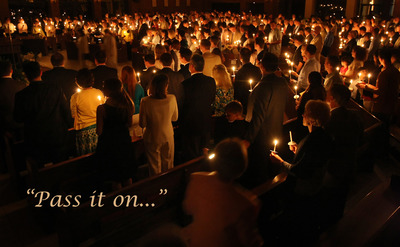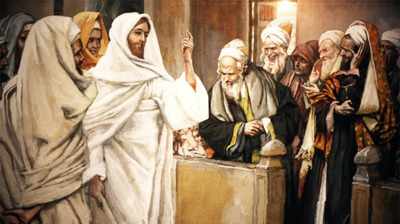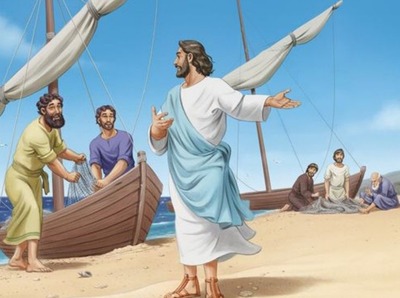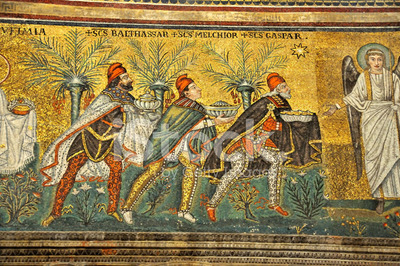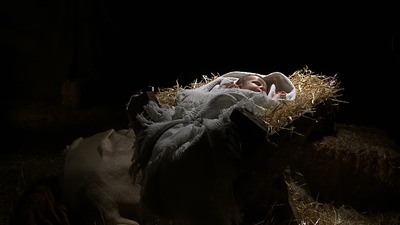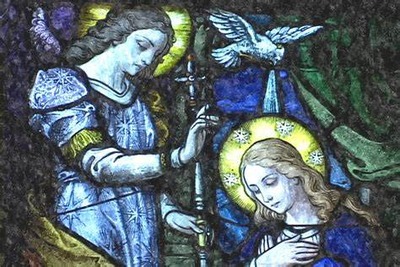December 24, 2023
|by N W
|
0 Comments
|
Advent, Christmas, Deacon Mark, Discipleship, Faith, Mary, Trust
Fourth Sunday of Advent
December 24, 2023 — Year B
Readings: 2 Sm 7:1-5, 8b-12, 14a, 16 / Ps 89 / Rom 16:25-27 / Lk 1:26-38
by Rev. Mr. Mark De La Hunt, Permanent Deacon
It is still Advent, but in case I don’t see you at Christmas Eve Mass today, Merry Christmas, Maligayang Pasko, Feliz Navidad, Joyeaux Noёl, Buon Natale, and Wesołych świąt.
Holy Name of Mary parish is dedicated to Jesus’ mother, Mary, and on this Fourth Sunday of Advent we enter into the first joyful mystery of her most holy rosary, the Annunciation. As a deacon in a Marian parish, how can I not center the homily on Mary, when Luke centered the beginning of his gospel on her “who was with child (Lk 2:5)?” Interestingly, Matthew starts his gospel centered on Mary as well and, though John waited until chapter two to introduce Mary, chapter one prepared for her grand entrance at Cana, with Mary as the Queen Mother, asking her son, Jesus the King, to help the young married couple.
In a predominantly Protestant area, we can feel uncomfortable speaking of Mary, even to the point of fearing mentioning the name of our parish. Peter Kreeft said that “[non-Catholic Christians] object to our Catholic devotion to Mary because they think it detracts from our adoration of Jesus.” He added, “In fact, it is exactly the opposite: the more we love Mary, the more we love Jesus, and the more we love Jesus, the more we love Mary (Kreeft 82).” Along those same lines, to try to put non-Catholics at ease with honoring Mary, someone once said, “You cannot love Mary more than Jesus does.”
But Peter Kreeft upped the ante and tied having a relationship with Mary to discipleship, to following Jesus. He wrote, “Jesus gave us Mary, when He said to St. John, the only disciple who stayed with Him at the cross, “Behold your mother” (John 19:27). So if we, like John, want to be Jesus’ disciples, if we want to be as close to Jesus as John was at the cross, then we must be close to Mary, because Jesus gave us Mary (82).”
Dr. Kreeft’s words are worth reflecting on. To be a disciple who will stand and face death and a seeming loss of all hope like John looking upon Jesus dying on the cross, it is most helpful to have Mary, the only perfect disciple, at your side like he did. For John must have realized that no matter how much sorrow he felt at that moment, it was not as deep as Mary’s, looking upon her only child dying in agony. Yet despite the awfulness of it all, neither Jesus’ suffering, a mocking crowd, nor the threat of mighty Roman soldiers could tear her from her Son’s side. When she told the angel Gabriel, “Behold, I am the handmaid of the Lord. May it be done to me according to your word,” she meant it for better or for worse (Lk 1: 38).
From the moment of her freewill consent, she became the Christ Bearer, the Mother of God. How did she prepare to bring Jesus into the world? First, she set out to care for someone in need, her cousin Elizabeth who Gabriel told her had conceived a child in her old age (Lk 1:39-56). Second, she and Joseph patiently suffered in faith and hope, traveling eighty miles or so from Nazareth to Bethlehem. Mary suffering in discomfort, probably riding a donkey, being so near to giving birth. Joseph, hurting from a longing to take her suffering upon himself, but only able to give her his tender care. Joseph suffering from not being able to find her a comfortable room in which to give birth, and Mary suffering from having to give birth away from the comfort of her home and friends (Lk 2: 1-7).
But as He always does, God brought them great joy and consolation when they thought they could endure no more pain and anxiety. Mary shows us the way to live our lives in faith and trust in God’s plan for us. This side of heaven, our journey will entail suffering and pain at times, but with Mary, we can bear it patiently, with great hope, and even joy. The hope and joy she brings to us is her Son.
In The Lord of the Rings movies based on the books of devout Catholic J.R.R. Tolkien, the battle between despair and hope, darkness and light is vividly displayed in rich symbolism for the cause for Mary’s hope. One depiction takes place at a great battle called Helm’s Deep (The Two Towers). The battle begins in darkness and rain, and the enemy vastly outnumbers the free people. They fight with valiant hope, but eventually wear down and accept that death is their fate, that evil will triumph over good and darkness over light. But then, they look to the east, to the rising sun, and grace descends upon them in the form of friends and an angelic figure, dressed in white, charging down a high hill to their aid.
In a second depiction, an even greater battle is taking place, and the situation is even more hopeless. A great white, stone city (think of it as your soul) is under siege and burning (The Return of the King). The city’s caretaker has fallen into despair from listening to the enemy’s voice more than to the voices of wise friends. As he walks in a somber procession to “die as he chooses,” the camera blurs out that hopeless scene and focuses on a single white flower that was barely noticeable in the foreground. The white flower was a sign, long awaited, that the city’s true king had returned and would restore the city to its former grandeur.
And so, here we are on the last Sunday of Advent, some of our suffering being voluntary from extra prayer, fasting, and charity, and some from the burdens and sorrows of life that weigh upon the young and old, rich and poor, strong and weak alike. If we bear our suffering and burdens with Mary, we will see what she saw in Bethlehem: hope in the newborn Savior, and hear what she heard from the shepherds about angels’ appearing in light with a message of peace. At every Mass, we, like those in Tolkien’s story at Helm’s Deep, look to the east. Catholic Churches, whenever possible, are oriented such that the altar is set in that direction.
In our suffering and worries, we look to the altar. We hear Father call to us, not to despair in the cares of this world, but to “lift up our hearts (Roman Missal Preface).” And then a little while later, he encourages us to, “Behold the Lamb of God,” and we look up, to the east and see Father, clothed in white like that angelic figure at Helm’s Deep, holding the rising Son, Jesus come to save us (Roman Missal The Order of Mass). Notice that to look upon the Eucharist is like looking upon the white flower in Tolkien’s white city. It is both reminder and reality that our long-awaited King has returned and will restore our soul to the grandeur God made it for from the beginning. Jesus did this for His mother from the moment of her conception, which is why the angel Gabriel called Mary by the title, “full of grace (Lk 1:28).”
I am going to close this homily with a poem that Peter Kreeft shared, entitled “Jesus and Mary.” It illustrates how knowing Mary helps us know her Son, especially in graces God sends to us and most especially in the Eucharist. Don’t get lost in all the words but hang on to the ones that touch your heart the most.
Body of Christ from Mary’s body;
Blood of Christ, from Mary’s blood.
Jesus the bread, Mary the yeast;
Mary the kitchen, Jesus the feast.
Mary the mother by whom we are fed;
Mary the oven, Jesus the bread.
Mary the soil, Jesus the vine;
Mary the wine maker, Jesus the wine.
Jesus the Tree of Life, Mary the sod;
Mary our God-bearer, Jesus our God.
Mary the silkworm, Jesus the silk;
Mary the nurse, Jesus the milk.
Mary the stem, Jesus the flower;
Mary the stairway, Jesus the tower.
Mary and Jesus, our castle entire;
Mary the fireplace, Jesus the fire.
Mary God’s ink, Jesus God’s name;
Mary the burning bush, Jesus the flame.
Mary the paper, Jesus the Word;
Mary the nest, Jesus the bird.
Mary the artery, Jesus the blood;
Mary the floodgate, Jesus the flood.
Mary and Jesus, our riches untold;
Mary the gold mine, Jesus the gold.
(Kreeft 82)
Mary, our mother, ask your Son to enable us always and in all circumstances, to remember to look east so that the Star of Joy and Hope may rise in our hearts and minds, every week being an Advent and every Sunday Mass a Christmas for us. Amen.
CITATIONS
J.R.R. Tolkien. “The Two Towers” and “The Return of the King.” New Line Productions, Inc. 2002-2003.
Kreeft, Peter. “Food for the Soul; Reflections on the Mass Readings, Cycle B.” Word on Fire 2023.
The Catholic Church. “The Roman Missal.” Catholic Book Publishing Corp., N.J. 2011.
KEEP READING
 540-586-8988
540-586-8988 



